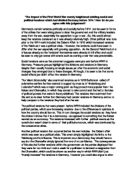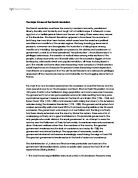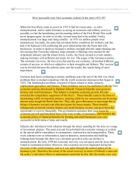Consider the following causes of the October 1917 Russian Revolution:
QUESTION 1 (Assessment of Causation) Consider the following causes of the October 1917 Russian Revolution: Poor Living and Working Conditions Effects of the First World War The Appeal of Lenin and the Bolsheviks The Limitations of the 1917 Provisional Government Was any one of these causes more important than the others to the Bolsheviks' seizure of power in 1917? Explain your answer. A1. When the Bolsheviks seized power in the October Russian Revolution, the country was in complete turmoil. Every one was unhappy about something and things weren't going so well for the Royal family and the aristocracy. The ongoing First World War with Russia was despised by the army, the terrible working conditions were unbearable for the industrial workers in the cities and the rich had all the best farming land which was hated by the peasants. This was the situation when the Bolsheviks, given Lenin as their leader, seized power and made to form a Communist nation from the philosophy of Karl Marx. In the cities, under the tall exhaust masts of factories laid millions of industrial workers who lived in atrocious conditions. They worked for up to 14 hours a day and received extremely low wages. Also, the Russian factories were not up to date and were not efficient at all. After a day like that, they hardy had any time for entertainment or any money left for the basic needs. The workers
The Role Of Women in WW2
Lauren Edwards 13D "How significant was the role of women in WW2, for Britain?" Women played a significant supportive role towards the successful outcome of World War 2. By the end of 1942, 10 million women aged between 19 and 50 were registered for war work. It was a total mobilisation on a scale never dreamed of by the Third Reich and it played a vital part in Britain winning through to eventual victory. In December 1941, Britain became the first nation in history to conscript women. This signifies a total war situation. Total war being the absence of any restraint in warfare. Initially, women were directed into land armies, factories and the military in March 1941. However, by July the manpower shortfall was such that it became clear drastic steps had to be taken. In December, all people aged between 18 and 60 regardless of sex were now obliged to undertake some form of part time national service. Most revolutionary of all, women were now to be conscripted for the first time in any modern civilised nation. The intensification of U-boat attacks on ships bound for Britain was ordered by Hitler in February 1941. In May, 142 merchant ships were sunk by German U-boats and air attacks accounted for a further 179. In addition to arms, shipments of bacon, beans and tinned meat as well as other vitals began that summer and were crucial to the battle to keep the nation fed. As
Why Did Mussolini become Prime Minister in 1922?
Why Did Mussolini become Prime Minister in 1922? In 1922 Mussolini became Prime Minister on 29th of October 1922 after his fascist supporters marched on Rome. Although this event happened directly before Mussolini became Prime Minister there are other reasons as to why Mussolini was able to become Prime Minister. Socialists and Squadristi The socialists proved a threat to the Liberal government as they gained the majority in the 1919 elections and then in the 1920 elections. Fascism though proved to be an effective weapon against the socialists mainly due to the fascist squads. The fascist squads reacted violently towards socialism attacking and rioting against them, the fact that a group was taking effective action against the socialists was an important factor as this meant many more people began to support fascism. Support was further gained by fascists Black Shirts in that they reduced the effectiveness of the socialist strikes by taking over operations of public services and railways which were affected due to the strike in order that they could run as normal. So this was yet another way in which the fascism gained support through actions against socialists. The support flourished and to some fascism proved to be the solution to socialism and as the support for fascism grew it also increased the likelihood for Mussolini to become Prime Minister. The Liberal
Political problems faced by the Third Republic in France 1870-1900:
Political problems faced by the Third Republic in France 1870-1900: The year 1871 signalled the end for the French 2nd Empire. The 2 September 1870, the Prussians had beaten, in Sedan, the French convincingly and had captured Napoleon III, France Emperor at the time. Two days later the third republic was proclaimed without violence. The new government continued resistance to the Germans who then laid siege to Paris. To defend the city, a National Guard was raised. Paris was besieged until January 1871. On 8 February 1871, a new National Assembly was elected and this one gave to Thiers the title of Chef du Pouvoir. This government was established at Versailles not in Paris because of revolt in the city. The Paris Commune was elected on 28 March with its seat at the Hotel de Ville but a civil war was fought between the Commune and the troops of the Versailles government. The Second Siege of Paris began. The Commune was suppressed by government troops led by Marshal McMahon.. In May the Nation Assembly approved the Treat of Frankfurt with Germany that ended the Franco-Prussian war but France lost Alsace and Lorraine. Between the years 1879 and 1914 the Third Republic faced 3 major crises. However the Republic survived. The split in French society was shown clearly by the
The Nazi take over of power between 1933 and 1934 constituted as a revolution.
"The Nazi take over of power between January 1933 and August 1934 constituted as a revolution in Germany." Do you Agree? 24marks A revolution is defined as a radical and pervasive change within a country, which covers all areas of politics, economics, culture and social structure, which occurs within a limited period of time and may include violence. Therefore, I do not agree with the motion as I do not believe that the changes within Germany between the years of 1933 and 1934 constituted as a full-scale revolution. There are several reasons why I believe a full-scale revolution did not occur, which are the lack of changes within the social, economic structure and also the fact that before this period of time, democracy was not fully functioning. However, I do agree to a certain extend as I believe that the changes in Germany within this period of time constitute as a political revolution, but nothing more. The reasons for this includes the change from democracy to dictatorship and the dissolution of major organisations including the Reichstag, and finally the intolerance towards political opposition. Firstly, one reason why I feel the events which occurred between January 1933 and August 1934 can not be described as a full-scale revolution is due to the lack of change within the social and economic structure of Germany. For many years during the Weimar Republic regime and
Describe the problems that faced the Bolsheviks in their first year in government and their solutions
Describe the problems that faced the Bolsheviks in their first year in government and their solutions Give me four years to teach the children and the seed I have sown will never be uprooted - Vladimir Lenin This is what Lenin announced as he came into power in November of 1917. It is argued that this was completed within the first couple of years of his ruling, though as with any new government, the first year was the most difficult. Many problems were encountered within that time, some handed from the previous provisional government, and others from the Bolsheviks themselves. The first of these large problems was an international one, and that was World War One. Russia had been fighting alongside the British and the French against Germany and the Austro-Hungarian Empire. The war had begun in 1914 and was currently draining Russia of its few precious resources, such as food, coal and iron. Being a Socialist movement, the Bolsheviks aim was to instigate peace.1 War went against their main beliefs, and this therefore had to be dealt with straight away. One of Karl Marx's most famous quotes was "No nation which oppresses others can itself be free" and Lenin was a great admirer of Marx and his theories on Communism. Not only this, but if the war had continued and had been won, Lenin was afraid that Germany may claim some of their land in victory, and this is
The Roles of Lenin and Stalin in the Russian Revolution.
The Roles of Lenin and Stalin in the Russian Revolution How should we interpret the Bolshevik Revolution, in the light of later events? Michael Lynch explains the issues with which we have to grapple and gives tips on how to impress the examiners. Did Stalin fulfil or betray the revolution that Lenin had begun in 1917? Was he the heir or the betrayer of Lenin? These are not simply academic questions specially thought up by fiendish examiners to terrorise candidates. They relate to a genuine historical debate that continues to cause controversy among politicians and to divide historians. Importance of the Theme Probably more books have been written about the Russian Revolution than any other event in the twentieth century. The reason is not hard to find. Despite the collapse of Soviet Communism in the early 1990s, there are Marxists who still believe that the Russian revolution was a unique event in human history. According to this belief, the taking of power by the Bolsheviks in October 1917 marked a momentous stage in the development of human society. The Bolshevik Party represented the proletarian masses whose historical role was to sweep aside their class oppressors. 1917 therefore, was a new dawn in human history. The workers of Russia had taken power for themselves. They had begun a revolution which would rapidly spread worldwide until it had destroyed capitalist
Operation Barbarossa and the Russian Offensive.
Operation Barbarossa and the Russian Offensive In 1941 Hitler tried to make one last gamble, he sent his foreign minister to meet the Russian foreign minister Vyaschlav Molotov, and accused the U.S.S.R. of continually breaking of the non-aggression pact signed by both countries. This is how Hitler made his case for war on the eastern front. Hitler's army prepared for an assault on Russia, which stretched over three thousand kilometres. The Russians knew of the impending threat of invasion but the Germans still managed to surprise them. The Russians has intelligence from their sources and from foreign powers. Yet this did not save them. The Germans used three main army groups: * The northern army was commanded by Field Marshall Wilhelm von Leeb * The central army was commanded by Field Marshall Fedor von Bock * The southern army was commanded by Field Marshall Gerd von Rundstedt. This map shows the German advance the red lines represent the army's advance and there intended destination. They planned to do a fast strong assault straight to Leningrad (St.Petersburg), Kiev and Moscow. They used 183 divisions to counter the Red Armies 170 divisions. This was only 54% of the Red Armies actual numbers. The plan was to occupy territory from Archangel to Astrakhan. Hitler was taking a big gamble when he decided to attack Russia. The war in western Europe still raged
Why were the Bolsheviks ultimately successful in the Russian civil war?
Nawal amari Why were the Bolsheviks ultimately successful in the Russian civil war? The Bolshevik victory was due partly to the lack of cooperation among the various white commanders and partly to the remarkable reorganization of the Red forces after Trotsky became commissar for war. The whites were geographically and ideologically divided, the whites were a coalition of different enemies of the Bolsheviks; these groups also hated each other as they were not all fighting for the same cause they all had their own idea as to what sort of right wing government they wanted, which left them with wars emerging within there own group. They were disunited and their armies were thousands of miles apart, generals Yudenich and Deniken attacked Russia from the west, Admiral Kolchak from the east. This meant that Trotsky could co-ordinate his forces much better, and fight his enemies one at a time. The whites were not organised enough to take on a strong force like the Reds. The Bolsheviks were able to isolate small groups of whites and take them out one by one, which was very effective. Compared to the Whites, the Red Army was united and disciplined. The Bolsheviks also kept strict control over their heartlands in western Russia. They made sure that the towns and armies were fed, by forcing peasants to hand over food, by rationing supplies and took over the factories of Moscow
Assess the reasons why the 2nd Republic was so short lived.
Assess the reasons why the 2nd Republic was so short lived. In 1848, agitation arose surrounding Louis Philippe, which led to his abdication later that year and the setting up of a republic in his departure. The 'Second Republic' was fated for failure and only reigned for an ineffective four years- between 1848 and 1852- before Louis Napoleon destroyed the republic in order to declare himself Emperor. I am going to discuss the combination of factors which contributed to the collapse of this flawed republic. In early 1848, under the government of Louis Philippe agricultural and industrial problems resulted in rioting, unrest and unemployment. Louis' legitimacy as king was beginning to be challenged and the middle class, eager for reforms caught hold of a revolutionary spirit performing in demonstrations including that of the 23rd February, where nearly 50 people were killed. Louis, feeble in the face of a revolution, abdicated and fled to Britain on the 24th of February 1848. The abdication of Louis-Philippe left a vacuum or power and authority. The legislative authority which was in session at the time would willingly have declared regency for the ex-King's mother until his son was of sufficient age to rule, had not the Republicans inside and outside the Assembly acted so swiftly. The middle class became worried as they were in the minority compared to the working class



























